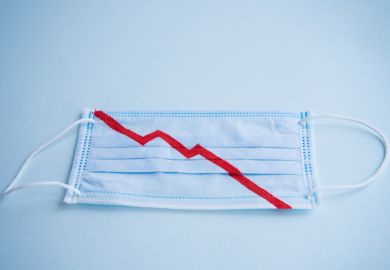Employer and staff pension contributions to UK higher education’s biggest pension scheme could reach nearly 70 per cent of salaries, according to proposals set out in its 2020 valuation consultation.
The Universities Superannuation Scheme consultation document, published on 7 September, estimates that to curtail the scheme’s rising deficit, future contributions would need to increase from the current 30.7 per cent to levels ranging from 40.8 per cent to 67.9 per cent of salaries.
According to the USS, the scheme’s deficit, which was £3.6 billion at the previous valuation in 2018, could range from £9.8 billion to £17.9 billion.
It says that the increase in contributions could be kept at the lower end of the scale and the deficit reduced to about £10 billion if employers agree to a range of measures, including a long-term rule change that would prevent employers leaving the scheme for the next 30 years and prioritising USS pensions over any new debt.
These commitments would mean that USS would be willing to take significantly more investment risk over the longer term compared with the 2018 valuation, the document says.
The increase in pension contributions and anger over their affordability has led to widespread industrial action in the sector, starting with strikes in 2018 that were reignited in 2019 and took place at 52 universities in 2020.
The wide range in potential contributions was because “there are a number of covenant-related factors outside our control that could change and which will be critical to the overall valuation outcome”, the USS says. This includes employer commitments but also the higher education sector’s resilience to the Covid-19 pandemic.
Writing in the consultation’s foreword, David Eastwood, chair of the trustee board, and Kate Barker, chair-elect, say that the major impact on financial markets of the Covid-19 pandemic means “experience has been notably worse than the economic assumptions and expectations that drove the 2018 valuation”.
“Against a more benign economic backdrop, we might have expected some of the changes we are proposing as part of the valuation to deliver better news for you. But circumstances have worked against us,” they write. They also add that even prior to the pandemic falling interest rates had affected the costs of pensions.
“We are acutely aware of how unwelcome the prospect of paying more will be. Nevertheless, it is something we must address, because we have a legal duty to protect the benefits promised to our members,” they add.
Paul Bridge, the University and College Union’s head of higher education, said that the union had “no confidence in the needlessly cautious methodology applied by the USS”.
“We want the USS to take account of the strong long-term outlook for the scheme. Members are leaving the scheme because of its high cost – calling for unnecessarily large reductions in benefits and increased member contributions is not the way forward. Universities need to start demanding more from the USS and push back against this approach,” Mr Bridge said.
A spokesperson for Universities UK, which represents 341 USS employers, said the figures “show the significant financial challenges facing the scheme at this time” and added that employers would require further information on some issues before they can fully respond.
“We want to continue a positive dialogue with the UCU and USS throughout this valuation, and to work with members and employers to secure an attractive and sustainable scheme through these economically challenging times. We should collectively explore potential ways of making it more appealing and inclusive, including the possibility of allowing members to opt to reduce their contributions in return for different benefits, rather than leave the scheme,” they said.
“Employers are acutely aware that the current employee contribution levels are leading to high levels of opt-out by younger and less well-paid staff, leaving them without any employer contributions to their pension provision. Now, more than ever, members need choice over contribution levels.”
Register to continue
Why register?
- Registration is free and only takes a moment
- Once registered, you can read 3 articles a month
- Sign up for our newsletter
Subscribe
Or subscribe for unlimited access to:
- Unlimited access to news, views, insights & reviews
- Digital editions
- Digital access to THE’s university and college rankings analysis
Already registered or a current subscriber?








